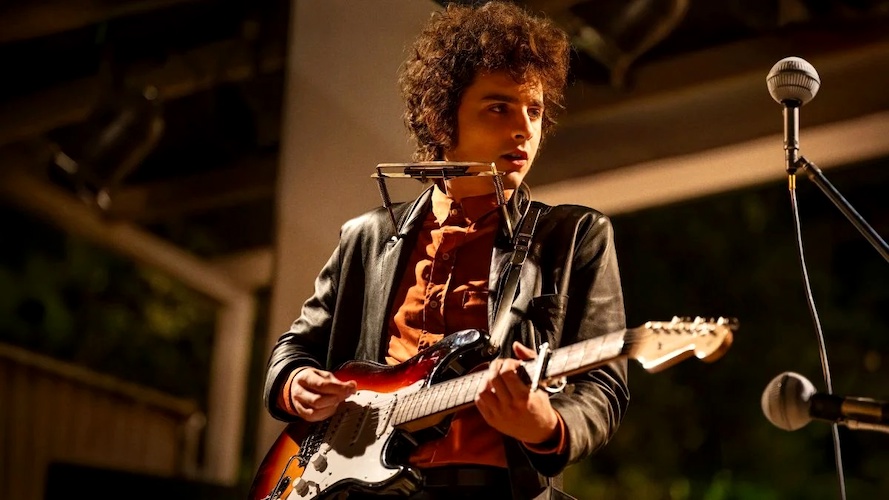The Lesson Disney Fans Should Take from “A Complete Unknown”
As a lover of film and awards season, some films I venture out to see on the big screen are more of a chore than pure excitement. (Did I really want to see A Real Pain? No. Was I into it? Also no.) I always try to be prepared for the winter’s onslaught of nominations, think pieces, and roundtables all dedicated to deconstructing the best cinema has to offer in any given year. A Complete Unknown felt a bit like an aforementioned chore.
While the trailer, cast, and crew behind the film all excited me beyond measure, I’ve never been a Bob Dylan die-hard. I am familiar with his work and influence, but that’s about it. Thus, the idea of watching yet another musical biopic felt like a bit of a slog. Luckily, I left invigorated. The film was a beautifully made ode to how everyone’s creative process is different, while also highlighting the remarkability of Dylan’s prose. Hooray for a film that I was dreading being enjoyable!
As is described in the trailer, a key turning point happens during the 1965 Newport Folk Festival, in which Bob Dylan decides to “go electric." It becomes a heated topic for the key figures involved with the folk music scene (i.e. Pete Seeger and Joan Baez) who want Bob Dylan to stick to what he knows best. He came up through folk music, why be original? Why be himself? Stick to what works. Of course, Seeger wants folk music to soar into the stratosphere, so when Dylan decides to leave the confines of the genre, there’s larger repercussions in Seeger’s mind.
He isn’t the only one, however, who wants Dylan to stick with what he knows best. During the 1965 performance in Newport, the film amps up the tension within the crowd as they begin to scream, belittle, and accost him throughout his performance using his electric guitar. In their minds, he’s a traitor. The fans have placed Bob Dylan inside a box and will not let him escape freely. As the film’s thesis explains, at a certain point in celebrity, the individuality shifts from the person themself to the greater public. You are not your own, you are everyone’s.
My biggest takeaway was this point and how dismaying this notion appears when we are on the flipside of the narrative. Of course, I have wanted things to go “my way" due to my love for an artist or brand (a director sticking to their genre, an artist releasing an album similar to their previous, etc.), too. Seeing Dylan feel like he’s being controlled by all those around him when making art has stuck with me as I contemplate my own actions going into 2025.
We are all Disney fans here and, thanks to the social media-ification of the brand, a lot of fans feel entitled to what is presented. “We demand specific clothing options because we are the ones spending money!" “This ride can’t close, it’s ours!" “How dare you do anything that doesn’t align with my specific likes and wants!" I am to blame for some of this as well, but social media has ruined the ability to experience the parks outside of greater opinion-based narratives and entitlement for fans.
Look at the Tally the Elf behemoth from the past month. A single performer was doing a phenomenal job of taking a yearly role in Mickey’s Once Upon A Christmastime Parade and turning it into a memorable experience for all guests. Immediately however, fans took his success as their own, working to spread his name and information elsewhere, fetishizing his work into something remarkably creepy and unsafe. (Just today, I saw people posting about Tally the Elf negatively, due to a certain performer not “being friends" with him that day…as if they are entitled to someone's schedule!) That’s not your right. Your right is enjoying the art being presented to you, not trying to finagle a performance into something it isn’t.
As I sat in the theater watching the crowd revolt against Dylan working on new music, what was being presented as historically bad is, unfortunately, more present than ever. Within the Disney fan community, the entitlement has crossed over into unhealthy. The magic does not owe you anything. The art exists all around you to experience, not as a springboard for your demands.
As I see more and more “influencers", a word I find demeaning to those with actual influence over the culture, using their social media accounts to demean and demand the company, the cast members, and the performers to bend at their will, I’m discouraged at where The Walt Disney Company can go from here. Will their art be able to survive without those trying to micromanage what is created, though they have no credentials themselves. Of course, proper criticism is welcomed, but when it’s those on social media thinking they are “owed" the name of a performer or something free because they didn’t listen to a rule, I remain afraid of the culture surrounding the world of creativity I hold so dear.
As we go into 2025, I hope the greater Disney fan community can look at A Complete Unknown as a prescient look at what’s to come if people don’t stop to realize their own behavior. At the end of the film, a title card pops on screen to tell viewers that the derided electric work was, when officially released, regarded as one of the most influential albums of all-time. Maybe this can be a learning moment for us all: to sit back, let the ideas bloom, and save our opinions for ourselves. Art is art. Let’s allow it to have ownership over itself.



